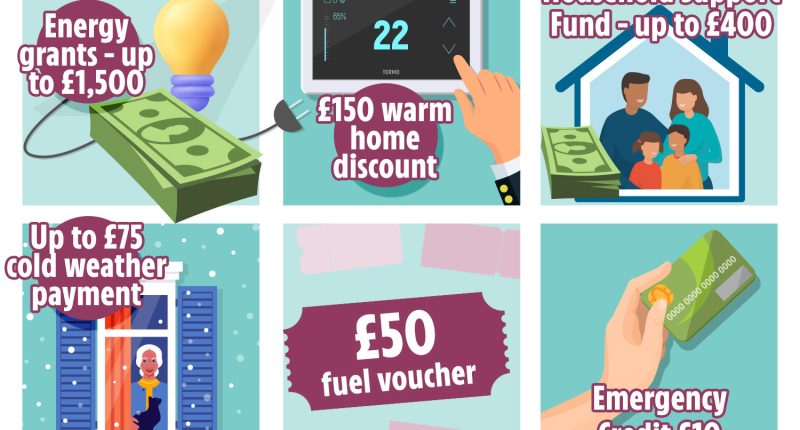WINTER weather has firmly arrived and the nights are drawing in across the country.
It means households will be turning their heating on to fight off the cold and keep warm.
But with the price of energy bills for the average family standing at £1,834 a year, you’ll want to do everything you can to cut costs.
Luckily, there’s a host of help available for hard-up Brits right now – here are a few ways you can keep your bills down.
Emergency credit – £10
If you’re on a prepayment meter and can’t afford to top up you can apply to your provider for what’s known as emergency credit.
How much you get depends on what firm you are with, although usually it’s worth up to £10.
Read more in Bills
The credit is only there to tie you over if you’re short and you have to pay it back.
You might be able to get extra emergency credit if you’re vulnerable or have other health conditions and your first amount runs out.
You should contact your supplier to see what’s available.
Cash for paying rent – up to £965
A Discretionary Housing Payment (DHP) is money from your council to help if you’re struggling to pay for rent.
Most read in Money
Anyone claiming Housing Benefit or the Housing Element of Universal Credit could qualify.
But what you could be entitled to depends on where you live as each local authority decides how much to dish out.
The Sun previously found the average DHP was £965, based on freedom of information requests sent to 30 of the biggest councils.
But the maximum amount you could get was worth up to £32,000 in total.
We’ve rounded up everything you need to know about who can get the cash and how to claim.
Cold Weather Payment – £25 a week
Thousands of struggling households can get £25 or more towards their energy bills through a Cold Weather Payment.
The Department for Work and Pensions (DWP) hands them out when temperatures drop to below zero for at least seven days.
That means if the weather is cold enough for 14 days you could receive £50, and so on.
But you usually have to be on certain benefits to qualify, which are:
- Pension Credit
- Income Support
- Income-based Jobseeker’s Allowance
- Income-related Employment and Support Allowance
- Universal Credit
- Support for Mortgage Interest
Cold Weather payments are made between November 1 and March 31 each year.
Those in Scotland don’t get a Cold Weather Payment but may be able to receive a Winter Heating Payment instead.
Cost of living payments – up to £899
The Government is dishing out cost of living payments worth up to £899 to households in need.
There are still two instalments of the £900 payment due to be made, worth £300 and £299, with the first due within weeks.
Meanwhile, millions of pensioners are in line for a top-up on their Winter Fuel Payment worth up to £300.
You will qualify for the top-up if you qualify for the Winter Fuel Payment – if you were born before September 25, 1957.
Household Support Fund – up to £400
Local councils in England are handing out help via bank payments, vouchers and other means through the Household Support Fund.
The latest batch of funding, which comes from the Government, is worth £842million.
How much you are entitled to varies depending on where you live, although it will usually be if you receive benefits or are on a low income.
It’s worth contacting your council to see what you can get – you can find yours by using the Government’s online council locator tool.
For example, residents in West Devon received £400 through the fund earlier this year.
Energy grants – up to £1,500
A number of energy firms offer grants to customers struggling to pay their bills.
But what you are entitled to varies depending on who your provider is.
British Gas offers grants worth up to £1,500 while households with Scottish Power can get up to £750.
Meanwhile, those with Octopus Energy can claim up to £500 via the firm’s Assist Fund.
It’s worth contacting your supplier to see what’s available to you.
Winter Fuel Payment – up to £600
Millions of pensioners are in line for a bumper Winter Fuel Payment over the colder months.
The payment is designed to cover the cost of higher energy bills when temperatures drop.
The cash boost is set to be distributed from November 1 and all should be made by the end of December.
You qualify for the payment if you were born on or before September 25, 1957, and lived in the UK for at least one day during the week of 18 to 24 September 2023, known as the qualifying week.
Fuel vouchers – worth £50
If you’re on a prepayment meter you might be able to get a one-off voucher to top up.
It comes via the Fuel Bank Foundation charity, and is offered through a range of organisations like food banks and Citizens Advice.
The best place to start to find somewhere which can offer you a fuel voucher is by asking your local council.
The voucher should help you cover around two weeks’ worth of electricity use.
Some energy companies may also issue their own vouchers, so ask your supplier directly.
Warm home discount – worth £150
Households can get £150 off their electricity bill for winter 2023 to 2024 through the Warm Home Discount scheme.
The money is not paid to you but is a one-off discount applied to your electricity bill between October and March every year.
In most cases, you’ll get the discount automatically if you’re eligible.
You only need to apply if you’re on a low income in Scotland and will need to contact your supplier directly.
You will be eligible for the automatic discount if you receive any of the following benefits:
Energy company payments for reducing usage – £15
Two energy firms are offering customers credit or payments if they reduce their energy consumption this winter.
Read More on The Sun
British Gas has extended its PeakSave Sundays scheme until December, offering customers a 50% discount on all electricity used each Sunday between 11am and 4pm.
Meanwhile, OVO Energy is paying eligible households £15 a month until December 31 if they reduce their energy consumption to less than 13.5% between 4pm and 7pm.
Do you have a money problem that needs sorting? Get in touch by emailing [email protected].
You can also join our new Sun Money Facebook group to share stories and tips and engage with the consumer team and other group members.










